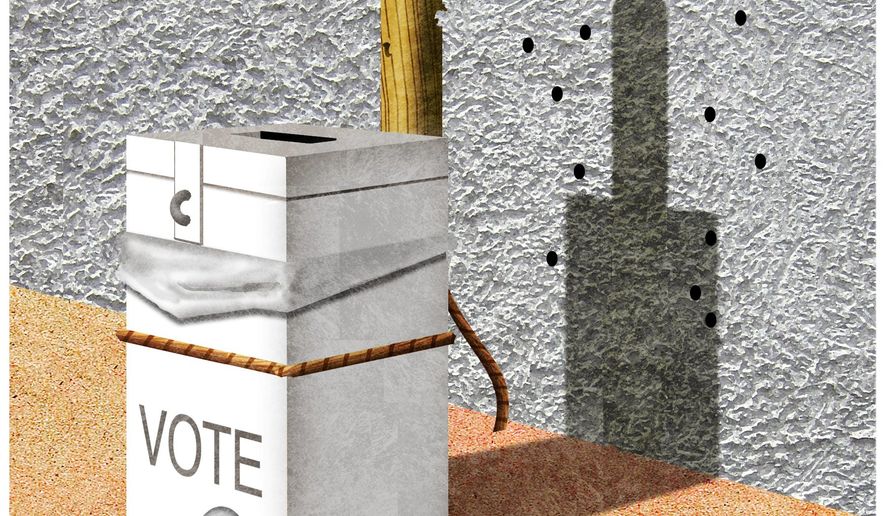OPINION:
The first bill a new House of Representatives introduces is a party-in-power wish list.
Last week, House Democrats passed H.R. 1 designed to rig future elections in their favor. This bill expands mail-in voting, strips states of their constitutional power to regulate federal elections and legalizes “ballot harvesting” nationwide so individuals can walk in batches of ballots. The bill would make it virtually impossible to determine whether any vote as legal — voter ID laws would be banned and no voter would have to vote where he or she actually lives
The bill would give felons the vote nationwide, require ballots that arrive as long as 10 days after Election Day to be counted, and bar state officials from reviewing the eligibility of voters or removing ineligible voters from the rolls. The House Democratic leadership labelled the 791-pages the “For the People Act” when truth-in-labelling standards would have required them to call it something like “The Ensuring Democratic Electoral Victory Act.”
Only one Democrat, Mississippi’s Bennie Thompson, voted against passage, recognizing that a federal takeover of the election process was not in the interests of his constituents and would only weaken the already fragile Federalism so important to the success of the American experiment. His colleagues had no such problems. They know that unless Democrats do something to rig the system future elections could put their present control of the House, Senate and White House at risk. To them, political survival requires drastic action and their For the People Act represents just that.
While media pundits spend their time examining the internal and external problems supposedly working against future Republican electoral success, serious progressive and Democratic analysts are more worried about their future. Their voting coalition, dependent upon their supposedly universal appeal to minority voters, is crumbling.
Significant numbers of Black and Hispanic voters find Republican stands on issues from immigration to tax policy and crime more attractive than what today’s Democrats are touting. This shift was glaringly obvious last November as Donald Trump’s vote proved more attractive to minority voters than anyone had predicted.
In a recent interview with Eric Levitz of New York Magazine, former Obama operative David Shor, who Mr. Levitz describes as “our favorite socialist proponent of ruthlessly poll-driven campaigning,” laid out the problems that will confront Democrats as soon as 2022. He believes Democrats must “reform” the way votes are registered, cast and counted in redrawn and friendlier districts or they will almost certainly lose both houses of Congress in two years and the White House in 2024.
Mr. Shor is a data junky with Open Labs, a progressive non-profit, who has been examining the entrails of the last election for months. The future he predicts is bleak for progressives because, as he sees reads the data, “we could be locked out of power for a very long time.” To prevent that from happening, Mr. Shor believes the passage of H.R. 1 is crucial. Without it, he says, “our chance of keeping the House is very low.” And to keep the Senate out of GOP hands he believes Democrats must make Puerto Rico and the District of Columbia states as “it’s very important that we add as many states as we can.”
Oh, he also favors what he calls “message discipline” that would allow progressive candidates to avoid hot button ideologically charged issues like immigration and attacks on the police that drive traditional Democrats into the hands of the GOP. It’s apparently acceptable for a progressive pol to hide his or her real agenda until after a successful campaign because as Mr. Shor reminds them, “how we should campaign and what we should do once in office are different questions.”
Still, messaging won’t guarantee victory. That will require rewriting the rules of the game.
His advice to Democrats is to move quickly and boldly or risk disaster. “Basically,” he says, “we have this small window right now to pass redistricting reform and create states. And if we don’t use this window, we will almost certainly lose control of the federal government and not be in a position to pass laws again potentially for a decade.”
Rejiggering the rules might be risky, but Mr. Shor is convinced the Democrats have no other choice if they want to hold onto the power now in their hands.
Mr. Shor and the Democratic party leadership know that H.R. 1 and statehood for Puerto Rico and the District of Columbia could be the ballgame and they are playing to win. They also believe they can get away with what they need to do to win because the public doesn’t usually focus on the consequences of procedural changes until it’s way too late.
The Senate must make sure this window closes before the progressive left puts a functioning and fair democratic electoral system to death.
• David A. Keene is an editor at large for The Washington Times.




Please read our comment policy before commenting.